哈佛公开课《幸福课》(课堂PPT)
哈佛大学幸福课PPT-04-Focus

– Affleck et al. (1987) – Bower (1998) – King & Miner (2000)
Longevity
“The joyfulness of a man prolongeth his days.” Ecclesiastes
Who is really detached? Focusing on the 90% full part of the glass Focus creates reality
Appreciating Appreciation
Ap-pre’ci-ate v., 1. Valuing; the act of recognizing the best in people or the world around us, affirming past and present strengths and potentials; to perceive those things that give life (health, vitality, excellence) to living systems. 2. To increase in value, e.g., the economy has appreciated in value.
A Matter of Interpretation
“A pessimist sees the difficulty in every opportunity; an optimist sees the opportunity in every difficulty.”
Winston Churchill
The Nun Study (Danner et al., 2001)
幸福课第一课:什么是幸福1xiuzheng1214
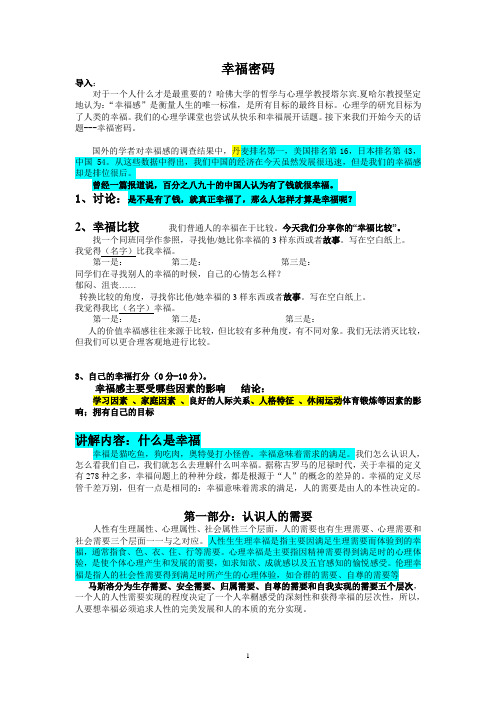
幸福密码导入:对于一个人什么才是最重要的?哈佛大学的哲学与心理学教授塔尔宾.夏哈尔教授坚定地认为:“幸福感”是衡量人生的唯一标准,是所有目标的最终目标。
心理学的研究目标为了人类的幸福。
我们的心理学课堂也尝试从快乐和幸福展开话题。
接下来我们开始今天的话题---幸福密码。
国外的学者对幸福感的调查结果中,丹麦排名第一,美国排名第16,日本排名第43,中国54。
从这些数据中得出,我们中国的经济在今天虽然发展很迅速,但是我们的幸福感却是排位很后。
曾经一篇报道说,百分之八九十的中国人认为有了钱就很幸福。
1、讨论:是不是有了钱,就真正幸福了,那么人怎样才算是幸福呢?2、幸福比较我们普通人的幸福在于比较。
今天我们分享你的“幸福比较”。
找一个同班同学作参照,寻找他/她比你幸福的3样东西或者故事。
写在空白纸上。
我觉得(名字)比我幸福。
第一是:第二是:第三是:同学们在寻找别人的幸福的时候,自己的心情怎么样?郁闷、沮丧……转换比较的角度,寻找你比他/她幸福的3样东西或者故事。
写在空白纸上。
我觉得我比(名字)幸福。
第一是:第二是:第三是:人的价值幸福感往往来源于比较,但比较有多种角度,有不同对象。
我们无法消灭比较,但我们可以更合理客观地进行比较。
3、自己的幸福打分(0分-10分)。
幸福感主要受哪些因素的影响结论:学习因素、家庭因素、良好的人际关系、人格特征、休闲运动体育锻炼等因素的影响;拥有自己的目标讲解内容:什么是幸福幸福是猫吃鱼,狗吃肉,奥特曼打小怪兽。
幸福意味着需求的满足。
我们怎么认识人,怎么看我们自己,我们就怎么去理解什么叫幸福。
据称古罗马的尼禄时代,关于幸福的定义有278种之多,幸福问题上的种种分歧,都是根源于“人”的概念的差异的。
幸福的定义尽管千差万别,但有一点是相同的:幸福意味着需求的满足,人的需要是由人的本性决定的。
第一部分:认识人的需要人性有生理属性、心理属性、社会属性三个层面,人的需要也有生理需要、心理需要和社会需要三个层面一一与之对应。
哈佛大学幸福课——第二十讲幸福与幽默
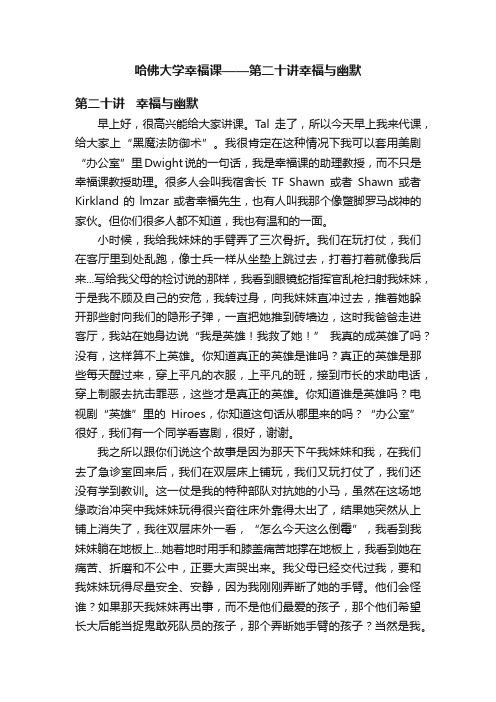
哈佛大学幸福课——第二十讲幸福与幽默第二十讲幸福与幽默早上好,很高兴能给大家讲课。
Tal走了,所以今天早上我来代课,给大家上“黑魔法防御术”。
我很肯定在这种情况下我可以套用美剧“办公室”里Dwight说的一句话,我是幸福课的助理教授,而不只是幸福课教授助理。
很多人会叫我宿舍长TF Shawn或者Shawn或者Kirkland的lmzar或者幸福先生,也有人叫我那个像蹩脚罗马战神的家伙。
但你们很多人都不知道,我也有温和的一面。
小时候,我给我妹妹的手臂弄了三次骨折。
我们在玩打仗,我们在客厅里到处乱跑,像士兵一样从坐垫上跳过去,打着打着就像我后来...写给我父母的检讨说的那样,我看到眼镜蛇指挥官乱枪扫射我妹妹,于是我不顾及自己的安危,我转过身,向我妹妹直冲过去,推着她躲开那些射向我们的隐形子弹,一直把她推到砖墙边,这时我爸爸走进客厅,我站在她身边说“我是英雄!我救了她!” 我真的成英雄了吗?没有,这样算不上英雄。
你知道真正的英雄是谁吗?真正的英雄是那些每天醒过来,穿上平凡的衣服,上平凡的班,接到市长的求助电话,穿上制服去抗击罪恶,这些才是真正的英雄。
你知道谁是英雄吗?电视剧“英雄”里的Hiroes,你知道这句话从哪里来的吗?“办公室”很好,我们有一个同学看喜剧,很好,谢谢。
我之所以跟你们说这个故事是因为那天下午我妹妹和我,在我们去了急诊室回来后,我们在双层床上铺玩,我们又玩打仗了,我们还没有学到教训。
这一仗是我的特种部队对抗她的小马,虽然在这场地缘政治冲突中我妹妹玩得很兴奋往床外靠得太出了,结果她突然从上铺上消失了,我往双层床外一看,“怎么今天这么倒霉”,我看到我妹妹躺在地板上...她着地时用手和膝盖痛苦地撑在地板上,我看到她在痛苦、折磨和不公中,正要大声哭出来。
我父母已经交代过我,要和我妹妹玩得尽量安全、安静,因为我刚刚弄断了她的手臂。
他们会怪谁?如果那天我妹妹再出事,而不是他们最爱的孩子,那个他们希望长大后能当捉鬼敢死队员的孩子,那个弄断她手臂的孩子?当然是我。
哈佛幸福课-积极心理学

哈佛幸福课——积极心理学目录第一章积极心理学初探 (1)一.积极心理学诞生的背景 (1)二、积极心理学课程的内容 (3)三.消极研究与积极研究 (6)四、积极心理学课程的目的 (9)第二章积极心理学的五个基本前提 (10)一、搭建学术界与社会之间的桥梁 (10)二、改变是可能的 (11)三、内在因素和外在因素 (12)四、顺从人类本性 (15)五、允许自己追求快乐 (20)第三章信念即自我实现预言 (23)一、信念挑战极限 (23)二、皮革马利翁效应(Pygmalion Effect) (24)三、情境的重要性 (26)四、创造积极的情境——精神的力量 (30)五、精神力量的作用机制 (33)六、乐观主义与悲观主义——同一事件不同解读 (35)七、高期望导致低自尊?NO! (38)八、三个方法让自己更乐观 (40)第四章专注 (44)一、积极者与消极者 (44)二、为什么不是人人都是乐观主义者 (48)三、感激 (50)第五章改变 (62)一、改变不易但非不可能 (63)二、神经可塑性 (65)三、我真的想要改变吗? (68)四、ABC与两种变化 (70)五、日记的神奇作用 (96)六、小结 (102)第六章设定目标 (106)一、目标设定的理论及实践 (106)二、处理压力 (128)第七章完美主义 (139)一、完美主义之我的个人经历 (139)二、错误与失败 (142)三、完美主义的定义及特征 (148)四、完美主义的后果及危害 (151)五、二八法则 (157)六、完美主义的根源 (159)七、克服完美主义 (161)八、铂金法则与黄金法则 (163)九、小结 (165)第八章精神与肉体 (167)一、关注“脖子以下” (167)二、身体锻炼 (169)三、冥想 (176)四、睡眠 (181)五、触摸 (183)第一章积极心理学初探一.积极心理学诞生的背景快乐,幸福感这一整个领域,此前一直被心理自助运动统治。
哈佛大学公开课幸福课原版课件ppt第十章自尊10-Self-Esteem

Criticism
Narcissism (arrogance and conceit)
―The person who feels weak becomes a bully, the inferior person a braggart; a flexing of muscles, much talk, cockiness, an endeavor to brazen it out, are symptoms of covert anxiety in a person or a group.‖ Rollo May
Enhancing self-esteem
Definition
―Self-esteem is the disposition to experience oneself as competent to cope with the basic challenges of life and as worthy of happiness.‖ Nathaniel Branden
– Express not impress – Assert yourself
Gradually expanding integrity
– From journaling to loved-one to world – From day to week to life-long
Truth sets us free
Competence Relative to Others Dependent Self-Esteem
Competence Relative to Self
Competence Interdependent
哈佛大学排名第一的公开课:幸福课(积极心理学)
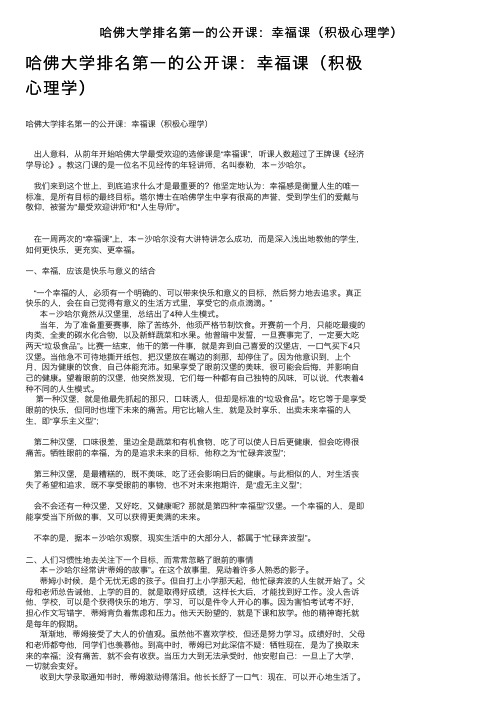
哈佛⼤学排名第⼀的公开课:幸福课(积极⼼理学)哈佛⼤学排名第⼀的公开课:幸福课(积极⼼理学)哈佛⼤学排名第⼀的公开课:幸福课(积极⼼理学)出⼈意料,从前年开始哈佛⼤学最受欢迎的选修课是“幸福课”,听课⼈数超过了王牌课《经济学导论》。
教这门课的是⼀位名不见经传的年轻讲师,名叫泰勒.本-沙哈尔。
我们来到这个世上,到底追求什么才是最重要的?他坚定地认为:幸福感是衡量⼈⽣的唯⼀标准,是所有⽬标的最终⽬标。
塔尔博⼠在哈佛学⽣中享有很⾼的声誉,受到学⽣们的爱戴与敬仰,被誉为"最受欢迎讲师"和"⼈⽣导师"。
在⼀周两次的“幸福课”上,本-沙哈尔没有⼤讲特讲怎么成功,⽽是深⼊浅出地教他的学⽣,如何更快乐,更充实、更幸福。
⼀、幸福,应该是快乐与意义的结合“⼀个幸福的⼈,必须有⼀个明确的、可以带来快乐和意义的⽬标,然后努⼒地去追求。
真正快乐的⼈,会在⾃⼰觉得有意义的⽣活⽅式⾥,享受它的点点滴滴。
”本-沙哈尔竟然从汉堡⾥,总结出了4种⼈⽣模式。
当年,为了准备重要赛事,除了苦练外,他须严格节制饮⾷。
开赛前⼀个⽉,只能吃最瘦的⾁类,全麦的碳⽔化合物,以及新鲜蔬菜和⽔果。
他曾暗中发誓,⼀旦赛事完了,⼀定要⼤吃两天“垃圾⾷品”。
⽐赛⼀结束,他⼲的第⼀件事,就是奔到⾃⼰喜爱的汉堡店,⼀⼝⽓买下4只汉堡。
当他急不可待地撕开纸包,把汉堡放在嘴边的刹那,却停住了。
因为他意识到,上个⽉,因为健康的饮⾷,⾃⼰体能充沛。
如果享受了眼前汉堡的美味,很可能会后悔,并影响⾃⼰的健康。
望着眼前的汉堡,他突然发现,它们每⼀种都有⾃⼰独特的风味,可以说,代表着4种不同的⼈⽣模式。
第⼀种汉堡,就是他最先抓起的那只,⼝味诱⼈,但却是标准的“垃圾⾷品”。
吃它等于是享受眼前的快乐,但同时也埋下未来的痛苦。
⽤它⽐喻⼈⽣,就是及时享乐,出卖未来幸福的⼈⽣,即“享乐主义型”;第⼆种汉堡,⼝味很差,⾥边全是蔬菜和有机⾷物,吃了可以使⼈⽇后更健康,但会吃得很痛苦。
哈佛大学公开课—幸福学(积极心理学)01

Meet the Grandparents
Abraham Maslow (1908-1970) Karen Horney (1885-1952)
Meet the Parents
Martin Philip Stone
Meet 1504
It is not merely about information It is also about transformation
Archibald MaCleish
Information is not enough
“Humanistic philosophy [offers] a new conception of learning, of teaching, and of education. Stated simply, such a concept holds that the function of education, the goal of education—the human goal, the humanistic goal, the goal so far as human beings are concerned—is ultimately the ‘self-actualization’ of a person, the becoming fully human, the development of the fullest height that the human species can stand up to or that the particular individual can come to. In a less technical way, it is helping the person to become the best that he is able to become.”
哈佛大学公开课:幸福课讲义--class11
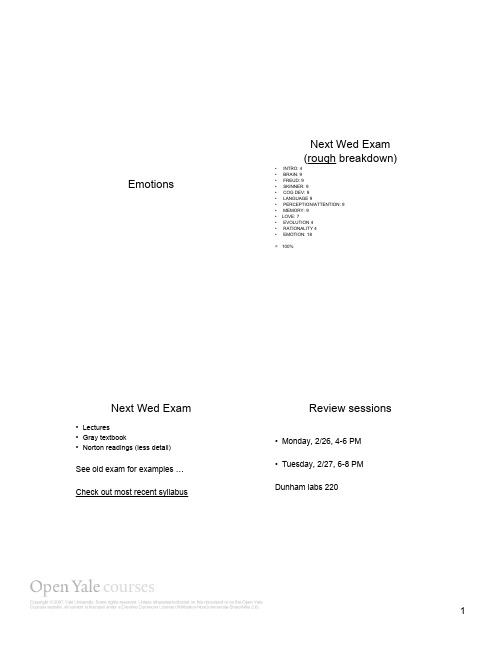
EmotionsNext Wed Exam• Lectures• Gray textbook• Norton readings (less detail)See old exam for examples … Check out most recent syllabusNext Wed Exam(rough breakdown) • INTRO: 4• BRAIN: 9• FREUD: 9• SKINNER: 9• COG DEV: 9• LANGUAGE 9• PERCEPTION/ATTENTION: 9• MEMORY: 9• LOVE: 7• EVOLUTION 4• RATIONALITY 4• EMOTION: 18= 100%Review sessions • Monday, 2/26, 4-6 PM• Tuesday, 2/27, 6-8 PM Dunham labs 220William James on human instincts To the psychologist alone can such questions occur as: Why do we smile, when pleased, and not scowl? Why are we unableto talk to a crowd as we talk to a single friend? Why does a particular maiden turnour wits upside-down? The common mancan only say: "Of course we smile, of course our heart palpitates at the sight ofthe crowd, of course we love the maiden …The wrong theory of emotions William James on human instincts And so, probably, does each animal feelabout the particular things it tends to do inthe presence of certain objects ... To thelion it is the lioness which is made to be loved; to the bear, the she-bear. To the broody hen, the notion would probably seem monstrous that there should be a creature in the world to whom a nestful ofeggs was not the utterly fascinating and precious and never-to-be-too-much-sat-upon object which it is to her ...Life is impossible withoutemotions• Evolved mechanisms that set goalsand priorities• Shaped by cultural context•But universal roots …Outline 1. Facial expressions--The case of smiling2. Non-social emotions--The case of fear3. Feelings toward kin4. Feelings toward non-kinMake a face• Lower your brows and draw themtogether• Tense your lower and upper eyelids • Stare. Your eyes can bulge somewhat • Press your lips together, with thecorners straight or down1. Universal feelings;universal facesMake a face (II)1. Raise the corners of your lips backand up2. Raise your cheeks3.Raise your lower eyelids (if you can)Smiles are universalSmiles are social signals• Bowlers• Olympic gold-medal winnersTwo types of smiles• Happiness smile (Duchenne smile) • “Pan am” smile, or greeting smile-- 10-month-olds-- Happy vs. unhappy couples-- College yearbook photosThere are different types ofsmilesA third smileCoy smiles, Appeasement smiles-entail gaze/face aversion-often with self-touch-in situations with potential fornegative evaluation of self-related to embarrassment-related to a desire to affiliate2. Non-social emotions:The case of fearSocial emotionsAltruism towards kinFearSpiders, snakes, heights, storms, large animals, darkness, blood, strangers, humiliation, deep water, leaving home alone-- what do these have in common? NOT: guns, cars, electrical outletsWhat are non-human primates afraid of? What are children in Chicago afraid of?Are animals merely survivalmachines?• Not according to evolutionary theory• Gene A: makes an animal care for itsoffspring• Gene B: makes an animal care only for itself • Gene A wins•It is reproduction that mattersForget about the animal for amoment …• Take the perspective of the …--cold virus--toxoplasmosis parasite--rabies virus• Animals are the vehicles that these organisms exploit to reproduceTake the perspective of thegene• Which genes survive?• Those that make the most copies of themselves• Animals are “vehicles” through which genes reproduce“An animal is merely the genes’ way of making another gene”Take the perspective of thegeneSelfish genes lead to altruisticanimals• To the extent that evolution operates at the level of the genes, there is no hard-and-fast distinction between oneselfand anotherHaldane’s--“Would you lay down your life for yourbrother?”--“No, but I would gladly give my life forthree brothers, or five nephewfirst cousins”Haldane’s math Haldane’s math--“Would you lay down your life for your --“Would you lay down your life for your brother?” brother?”(who has 50% of your genes) (who has 50% of your genes)--“No, but I would gladly give my life forthree brothers (150%), or five nephews(125%), or nine first cousins (112.5%)Choose:You die or your three brothersdie• Gene A: makes an animal choose to die • Gene B: makes an animal choose forits brothers to die• Gene A winsAnimals have evolved to benice to kin• Particularly their children (50% of genes)• And particularly birds and mammals• Quality, not quantity• Long period of dependence prior to sexual maturity• Two types of psychological mechanisms:--how parents respond to children--how children respond to parents When a new male takesover a pride (by killingor driving out theprevious male) …--he kills all remainingcubs--pregnant lionessesundergo spontaneousabortionsBaby attachment to the parent• The cupboard theory (Skinner)• Innate attachment (Bowlby)--positive: drawn to mom for comfort andsocial interaction--negative: fear of strangersHarlow: Wire mothers vs. cloth mothers。
哈佛公开课幸福课(2)_OK
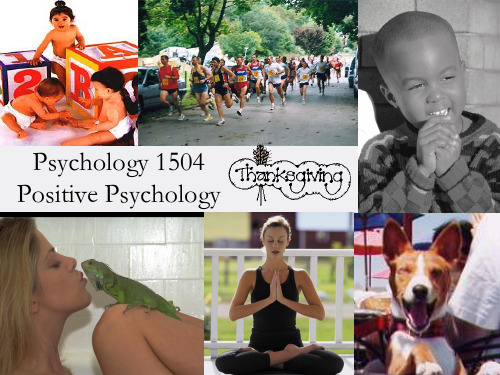
“Words are not the sole medium of exchange in teaching and learning—we educate with silence as well. Silence gives us a chance to reflect on what we have said and heard… In authentic education, silence is treated as a trustworthy matrix for the inner work students must do, a medium for learning of the deepest sort.”
Psychology 1504 Positive Psychology
1
Bridging Ivory Tower and Main Street
The objective of positive psychology is to unite the rigor of academic research with the accessibility of the self-help movement.
“The science of psychology has been far more successful on the negative than on the positive side; it has revealed to us much about man’s shortcomings, his illnesses, his sins, but little about his potentialities, his virtues, his achievable aspirations, or his psychological height. It is as if psychology had voluntarily restricted itself to only half its rightful jurisdiction, and that the darker, meaner half.”
哈佛大学公开课--幸福课-第一集演讲内容及部分内容

○哈○佛○大○学○公○开○课整理:耿加稳校对:小帅哥I'm teaching this class because i wish a class like this had been taught when I was sittingin your seat as an undergrad here.I came here in 1992,and started at computer science.And then I had a mini epiphany halt way through my sophomore year.I realized that I was in a wonderful place with wonderful students around me,wonderful teachers.I was doing well acedemically.I was doing well in athletics.I was doing well socially.Everything going well.Except for the fact that I was unhappy.And I didn't understand why.It was then in a matter of moments that I decided to find out why and became happier.And that was when I switched my concentration from computer science to philosophy and psychology.With single question how can I became happier.Overtime I did became happier,what contrbuted most to my happiness was when I encounted a new emerging field that time didn't have a name that it has today.But essentially research that falls uder or with the field of positive psychology. Positive psychology studying it,applying the ideas to my life has made me significantly happier,It continues to make me happier,And I realized the impact that it had on me that I decided to share it with others.So this is positive psycology,and we will be exploring this new,relatively and fascinating field.And hopefully, we will be exploring more than the field ourselves.“How can this lecture is larger than the Introduction to Economics”.And the way to explain it must be that the teacher is very outgoing,extremly charismatic,very cheerful and extrovert and of course ,tall.Why is it so popular,because it works,You see this whole realm on life flouring on happiness,on well being has been until recently dominated by the self-health movement(心理自助运动).what do we have in the self-health movement?We have that books are very intering,that are very accessible,we have speakers are very outgoing attracting the masses into these workshops,seminars and lectures.But there is a big “but”here.Many of those books,many ot these workshop and seminars lack of substances(缺少实际内容).very often,overpromising and under-delivering.So those are five things you need to know to be happy.The three things to be the greatl eader.The one secret of success,happiness and a perfect love life. overpromising and under-delivering(夸大其词,效果甚微).On the other hand, we have academica(学术界),what do we have in academia?We have a lots of rigor, a lot of substances.We have datas analayzed,reanalyed and meta-analyzed.things really work,really good stuff.But there is also a big “but”here.Very few people read refereed acedemic journals.I mean think about it:how many of people outside this room of course have read the last twelve issues of the Journal of Personnality and Social Psychology(个性与社会心理学)?Most pepple don’t even know what that means.The head of my PHD programs actually estimated the average academic journal arctical is read by seven people.You know…and that include the author’s mother.So you know I say half in jest but it’s atually really sad。
哈佛《幸福课》--PPT课件

.
26
Psychology Needs Help
• 21/1 ratio is unhealthy… • … but it reflects reality
哈佛《幸福课》 ppt课件 psychology1504 positive psychology bridgingivory tower mainstreet positivepsychology academicresearch self-helpmovement. housekeeping we'lltake activenote-taking regulartime-ins solemedium learning—we educate well.silence gives us whatwe have said authenticeducation, silence trustworthymatrix innerwork students must do, deepestsort.‖ positivepsychology humanisticpsychology (50's) thirdforce behaviorism(first force) psychoanalysis(second force) lackedrigorous methodology abrahammaslow (1908-1970) karen horney (1885-1952) meet grandparentsaaron antonovsky (1923-1994) parentsmartin seligman ellen langer philip stone meet1504 merelyabout information alsoabout transformation coveringless; uncovering more knowledge,every day something wisdom,every day something dropped.‖lao tzu soulgrows addition.‖thoreau makingcommon sense more common 12information enough―what greatdiscoveries science—information alwaysbetter than ignorance, matterwhat information whatignorance. what beliefbehind won't.‖archibald mac
哈佛大学幸福课讲义

哈佛大学幸福课讲义目录前言Tentative ScheduleFebruary 2:IntroductionFebruary 7:Why do we need a Positive Psychology?February 9:Basic Premises I (what�s this class about, anyway?)February 14Basic Premises II (oh, I see)February 16:Beliefs as self-fulfilling prophecies I (psychology of success) February 21:Beliefs as self-fulfilling prophecies II (and more success)February 23: Question of focus I (hey, look here)February 28:Question of focus II (so much to look at...)March 2:Can we change?March 7:Y es, we can changeMarch 9: Physical health (sleep is good i.e. why this class starts at 11:30)March 14:Setting goals I (from lofty todo lists...)March 16:Setting goals II (... to earthly visions)March 21:MidtermMarch 23:Review and questions (everything you wanted to know, and... have awonderful break)SPRING BREAKApril 4: �Perfectionism I (at Harvard)April 6:Perfectionism IIApril 11: Mindfulness (Ohmmmmmm)April 13: Humor (finally, some fun in this class)April 18: Relationships I (love, friendship, and other good stuff)April 20: Relationships IIApril 25:Self-esteem IApril 27:Self-esteem IIMay 2:The good life (wait, what was the course about until now?)May 4:What Now? (the next step, the one after, and farewell�:(前言幸福是一门科学2002年,我第一次在哈佛大学教授积极心理学,当时有八个学生报名,其中还有两人中途退课。
幸福课-哈佛大学公开课

名人名言
提高自尊的方法:面对而不是逃避。 《永恒的治疗》〈适应力因素〉
第七讲 (7.12)45min)
谢谢!
26
全在你自己。”
我会行动,行动会增加我的自信。
第三讲 幸福是一种随机现象吗? (6.15)
“注重培养能力,而非改正错误!” 能否改变自己的人生,要靠自己,
没能帮。
为什么少数条件恶劣的人也能成功。
第四讲 积极的环境能改变人 (6。20)
笑是传染的,
“我们活着的人每分钟都在影响世 界和他人,问题是我们选择哪外方 向,是成为推动改变的力量?深思 熟虑,还是成为实践理想主义者?
必须努力发挥下面指数函数的作用。
“把爱传出去”影响三个人
准许自己为人:各种情绪的出现是 人之常情。
第五讲 环境的力量(6.29)
恶性情绪:下行螺旋; 抑郁:思维收窄;
自我帮助:为自己争取快乐
第6讲:信念即自我实现预言 (7.11)
《思考致富》《正面思考的力量》 《秘密》:相信就会成功(言过其
实)
问题缔造现实:我们所问的问 题,通常决定了我们所追求的 东西。我们会走的道路,我们 会• 提追出求正确的的生问题活,。以求问题的解决:
• 只关注自己的缺点与不足,就不会发现 自己的优点和长处。
Marva collins:从专注缺点到 专注优点
适应力:寻找一个榜样。
不断重复这样的信息:“你会成功, 你能做好,承担生活的责任,停止 报怨,停止抱怨政府,停止报怨老 师,停止抱怨父母。”“成功与否
哈佛大学公开课 幸福课-什么是积极心理学
第一讲: (6.3) 哈佛MBA毕业生中格外出色的一部分:
哈佛幸福课课件10-Self-Esteem
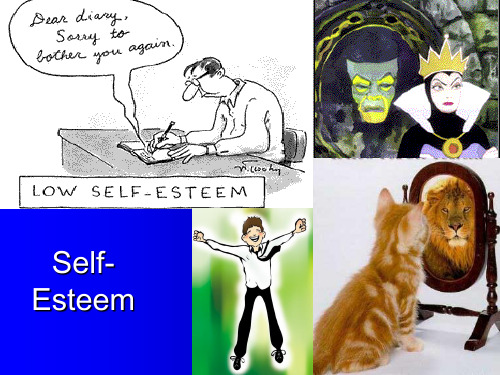
Goethe
High Self-Esteem
Mental Health Quality of relationships Success Social effectiveness Happiness
Competence Relative to Others
Dependent Self-Esteem
Competence Relative to Self
Independent Self-Esteem
Competence Interdependent
Unconditional Self-esteem
SelfEsteem
Outline
The importance of self-esteem What self-esteem is… and is not The paradox of self-esteem Toward a new understanding
– Dependent self-esteem – Independent self-esteem – Unconditional self-esteem
Enhancing self-esteem
Definition
“Self-esteem is the disposition to experience oneself as competent to cope with the basic challenges of life and as worthy of happiness.”
Rollo May
- 1、下载文档前请自行甄别文档内容的完整性,平台不提供额外的编辑、内容补充、找答案等附加服务。
- 2、"仅部分预览"的文档,不可在线预览部分如存在完整性等问题,可反馈申请退款(可完整预览的文档不适用该条件!)。
- 3、如文档侵犯您的权益,请联系客服反馈,我们会尽快为您处理(人工客服工作时间:9:00-18:30)。
.
8
Affect: Our Emotions
.
9
Gradual Change: Mindfulness Meditation
“Cultivating mindfulness can lead to the discovery of deep realms of relaxation, calmness, and insight within yourself... The path to it in any moment lies no farther than your own body and mind and your own breathing.”
Jon Kabatt-Zin
“All of us have the capacity to be mindful. All it involves is cultivating our ability to pay attention in the present moment.”
Jon Kabatt-Zin
Is there a positive equivalent to trauma?
Can a single positive experience create a positive
channel that will lead to a permanent increase in
well-being, calm, and positive memories?
Learning (and applying) Your ABC’s
• Affect • Behavior • Cognition
• Need all three
.
7
Happiness =
Genetic set range +
External circumstances +
Intentional activities (ABC)
• Change is possible
– Error of the average – The exception proves the rule
.
2
The Anatomy of Change
• Neuroplasticity (Davidson, 2000) • Neural pathways (channels) • Self-reinforcing • Habits as fortified pathways
Change
.
1
The Nature of Change
• Change is hard
– Twin research (Lykken & Tellegan, 1996) – Affective forecasting (Gilbert, 1998) – Cambridge-Somerville study
• Gradual approach • Acute approach • Neither is quick we can rely on shortcuts to gratification and bypass the exercise of personal strengths and virtues is folly. It leads... to legions of humanity who are depressed in the middle of great wealth and are starving to death spiritually.”
Drive/ambition
Worry/anxiety
Responsibility
Guilt
Empathy/sensitivity
Simplify
Lose edge
Fault-finding
Realism
Happiness
No pain no gain
.
6
• A more nuanced understanding of what change
Martin Seligman
.
5
But do I really want to change?
(Langer & Thompson 1989)
Rigidity
Consistency
Gullibility
Trustworthiness
Grimness
Seriousness
Perfectionism
reject the emotion itself.”
.
10
Tara Bennett-Goleman
Acute Change
• Post Traumatic Stress Disorder (PTSD) • Widespread (Society for Neuroscience) • Creating new pathways (shock treatment) • Post traumatic growth (Tedeschi & Calhoun)
“Mindfulness means seeing things as they are, without
trying to change them. The point is to dissolve our
reactions to disturbing emotions, being careful not to
.
11
Acute Change Through Peak Experience
.
12
Acute Change Through Peak Experience
“The term peak experiences is a generalization for the best moments of the human being, for the happiest moments of life, for experiences of ecstasy, rapture, bliss, of the greatest joy. I found that such experiences came from profound aesthetic experiences such as creative ecstasies, moments of mature love, perfect sexual experiences, parental love, experiences of natural childbirth, and many others.”
.
3
Healthy and Unhealthy Pathways
• Negative channels • Positive channels • Same trigger,
different response • Trans-forming the
brain
.
4
Two Types of Change
